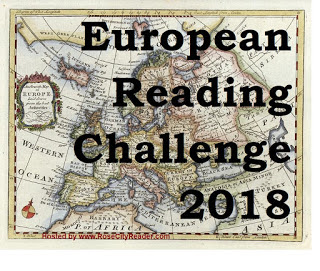My second and final reading challenge for 2018 will be The European Reading challenge 2018 hosted by
Rose City Reader.
THE GIST: The idea is to read books by European authors or books set in European countries (no matter where the author comes from). The books can be anything – novels, short stories, memoirs, travel guides, cookbooks, biography, poetry, or any other genre. You can participate at different levels, but each book must be by a different author and set in a different country – it's supposed to be a tour. (See note about the UK, below)
WHAT COUNTS AS "EUROPE"?: We stick with the same list of 50 sovereign states that fall (at least partially) within the geographic territory of the continent of Europe and/or enjoy membership in international European organizations such as the Council of Europe. This list includes the obvious (the UK, France, Germany, and Italy), the really huge Russia, the tiny Vatican City, and the mixed bag of Baltic, Balkan, and former Soviet states.
THE LIST: Albania, Andorra, Armenia, Austria, Azerbaijan, Belarus, Belgium, Bosnia and Herzegovina, Bulgaria, Croatia, Cyprus, Czech Republic, Denmark, Estonia, Finland, France, Georgia, Germany, Greece, Hungary, Iceland, Ireland, Italy, Kazakhstan, Latvia, Liechtenstein, Lithuania, Luxembourg, Malta, Moldova, Monaco, Montenegro, Netherlands, Norway, Poland, Portugal, Republic of Macedonia, Romania, Russia, San Marino, Serbia, Slovakia, Slovenia, Spain, Sweden, Switzerland, Turkey, Ukraine, United Kingdom, and Vatican City.
NOTE: Even after Brexit, the United Kingdom is still one country, in Europe, that includes England, Scotland, Wales, and Northern Ireland. So one book from any one of these four counts as your one book for the United Kingdom. I'm not going to be a stickler about it because challenges should be about fun not about rules. However, when it comes to winning the Jet Setter prize, only one book from one of the UK countries will count.
LEVELS OF PARTICIPATION
FIVE STAR (DELUXE ENTOURAGE): Read at least five books by different European authors or books set in different European countries.
FOUR STAR (HONEYMOONER): Read four qualifying books.
THREE STAR (BUSINESS TRAVELER): Read three qualifying books.
TWO STAR (ADVENTURER): Read two qualifying books.
ONE STAR (PENSIONE WEEKENDER): Read just one qualifying book.
JET SETTER PRIZE
The participant who reads and reviews the greatest number of qualifying books (more than five) will get a $25 gift card to Powell's Books (can be used in store or on line). Participants living in Europe will get a $25-equivalent gift card to the Amazon store in your country, if possible. If you live in a country where neither Powell's nor Amazon will work, then sorry, you are out of luck.
Each book must be by a different author and set in a different country. This means that only one book from one of the four UK countries will count. Only books reviewed count towards the prize
Read all books between January 1, 2018 and January 31, 2019. I like having 13 months so there is extra time to finish after the holidays. However, if you participated in the 2017 European Reading Challenge, you can only count books read in January 2018 for one year -- either the end of the 2017 challenge or the start of the 2018 challenge -- you don't get to count one book for both challenges.
More info about rules and so forth to be found on the
Sign-up page.
~~~~~
I'll be going for:
FIVE STAR (DELUXE ENTOURAGE): Read at least five books by different European authors or books set in different European countries.
I already have a load of books set in France to start me off, and Italy, it'll be difficult to choose just one but I'm sure I'm up to it. But I would also like to try and read something from more unusual countries, just depends what I can find.
~~~oOo~~~

































